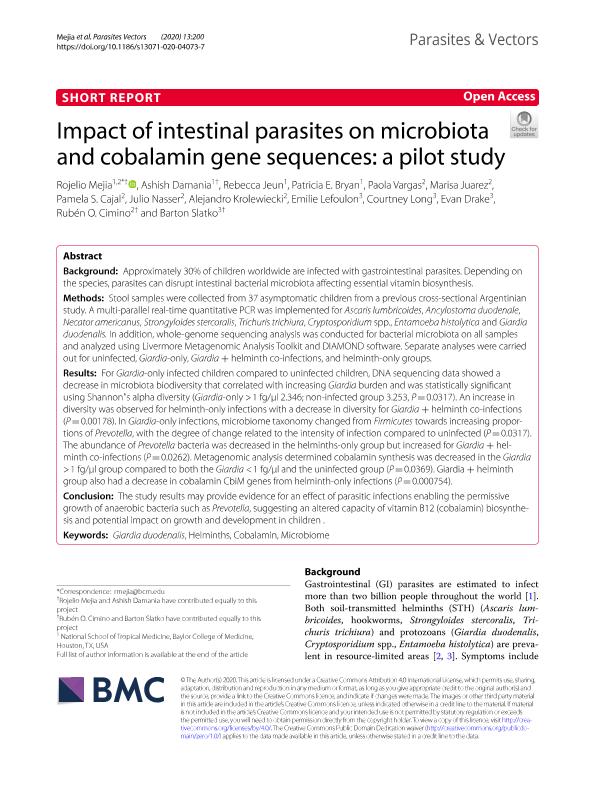Artículo
Impact of intestinal parasites on microbiota and cobalamin gene sequences: A pilot study
Mejia, Rojelio; Damania, Ashish; Jeun, Rebecca; Bryan, Patricia E.; Vargas, Paola; Juarez, Marisa del Valle; Cajal, Silvana Pamela; Nasser, Julio Rubén; Krolewiecki, Alejandro Javier ; Lefoulon, Emilie; Long, Courtney; Drake, Evan; Cimino, Rubén Oscar
; Lefoulon, Emilie; Long, Courtney; Drake, Evan; Cimino, Rubén Oscar ; Slatko, Barton
; Slatko, Barton
 ; Lefoulon, Emilie; Long, Courtney; Drake, Evan; Cimino, Rubén Oscar
; Lefoulon, Emilie; Long, Courtney; Drake, Evan; Cimino, Rubén Oscar ; Slatko, Barton
; Slatko, Barton
Fecha de publicación:
04/2020
Editorial:
BioMed Central
Revista:
Parasites and Vectors
ISSN:
1756-3305
Idioma:
Inglés
Tipo de recurso:
Artículo publicado
Clasificación temática:
Resumen
Background: Approximately 30% of children worldwide are infected with gastrointestinal parasites. Depending on the species, parasites can disrupt intestinal bacterial microbiota affecting essential vitamin biosynthesis. Methods: Stool samples were collected from 37 asymptomatic children from a previous cross-sectional Argentinian study. A multi-parallel real-time quantitative PCR was implemented for Ascaris lumbricoides, Ancylostoma duodenale, Necator americanus, Strongyloides stercoralis, Trichuris trichiura, Cryptosporidium spp., Entamoeba histolytica and Giardia duodenalis. In addition, whole-genome sequencing analysis was conducted for bacterial microbiota on all samples and analyzed using Livermore Metagenomic Analysis Toolkit and DIAMOND software. Separate analyses were carried out for uninfected, Giardia-only, Giardia + helminth co-infections, and helminth-only groups. Results: For Giardia-only infected children compared to uninfected children, DNA sequencing data showed a decrease in microbiota biodiversity that correlated with increasing Giardia burden and was statistically significant using Shannon's alpha diversity (Giardia-only > 1 fg/μl 2.346; non-infected group 3.253, P = 0.0317). An increase in diversity was observed for helminth-only infections with a decrease in diversity for Giardia + helminth co-infections (P = 0.00178). In Giardia-only infections, microbiome taxonomy changed from Firmicutes towards increasing proportions of Prevotella, with the degree of change related to the intensity of infection compared to uninfected (P = 0.0317). The abundance of Prevotella bacteria was decreased in the helminths-only group but increased for Giardia + helminth co-infections (P = 0.0262). Metagenomic analysis determined cobalamin synthesis was decreased in the Giardia > 1 fg/μl group compared to both the Giardia < 1 fg/μl and the uninfected group (P = 0.0369). Giardia + helminth group also had a decrease in cobalamin CbiM genes from helminth-only infections (P = 0.000754). Conclusion: The study results may provide evidence for an effect of parasitic infections enabling the permissive growth of anaerobic bacteria such as Prevotella, suggesting an altered capacity of vitamin B12 (cobalamin) biosynthesis and potential impact on growth and development in children.
Palabras clave:
COBALAMIN
,
GIARDIA DUODENALIS
,
HELMINTHS
,
MICROBIOME
Archivos asociados
Licencia
Identificadores
Colecciones
Articulos(CCT - SALTA-JUJUY)
Articulos de CTRO.CIENTIFICO TECNOL.CONICET - SALTA-JUJUY
Articulos de CTRO.CIENTIFICO TECNOL.CONICET - SALTA-JUJUY
Citación
Mejia, Rojelio; Damania, Ashish; Jeun, Rebecca; Bryan, Patricia E.; Vargas, Paola; et al.; Impact of intestinal parasites on microbiota and cobalamin gene sequences: A pilot study; BioMed Central; Parasites and Vectors; 13; 1; 4-2020; 1-9
Compartir
Altmétricas



